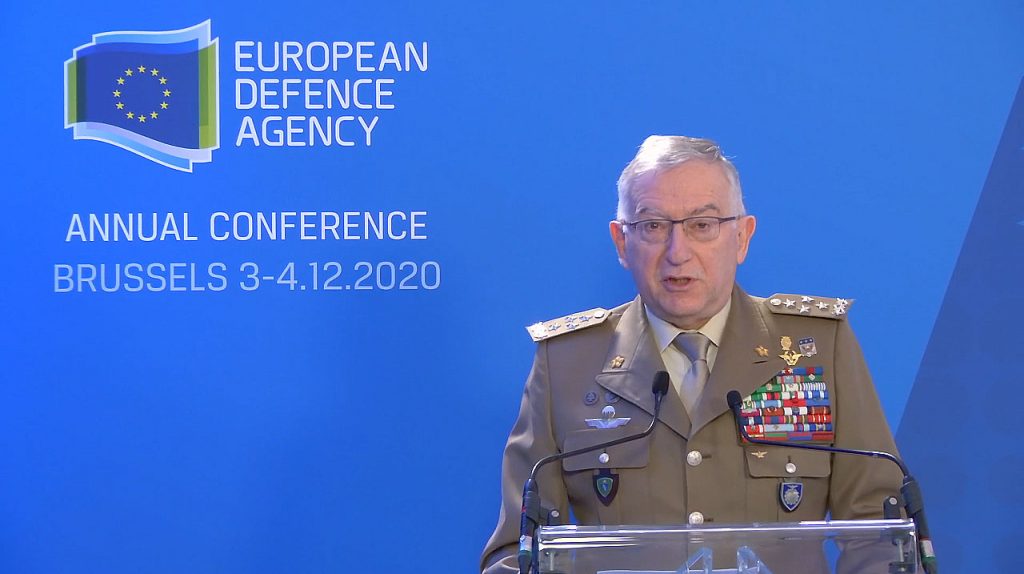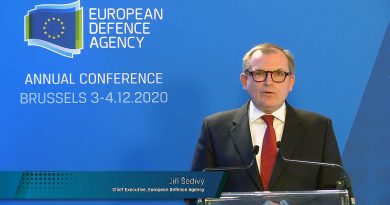
The Military Viewpoint – Gen. Claudio Graziano, Chairman, EU Military Committee
The third speaker of the Day 1 EDA Annual Conference was Gen. Claudio Graziano, former Italian CHOD and currently the Chairman of the European Military Committee (EMC). He first highlighted the strong cooperation link between the EMC and the EDA, to which the EMC provides advice and end-user perspective; “We all know that the end-user, by definition, is the ultimate consumer of a final product, which in case of the military domain can be a weapon, a system, or even a policy. But the role of the end user, especially in a complex system like the EU defence, is not limited to products but goes further than this. Military inputs and expertise coming from the field represent an essential factor for the best definition of the product itself, optimising the outcome of the whole manufacture chain.”
He then underlined that it is the operational component that drives the changes, asking for capabilities needed to accomplish its tasks. This means fulfilling the EU Level of Ambition (LoA) decided by politics. “If needed, we must have the necessary capabilities to win the war,” he summarised. The introduction of new capabilities has, according to the EMC Chairman, affected the way we manage and even perceive conflicts. Stressing that the reference for the military must be the more demanding, high intensity scenario, as this includes also lower intensity ones which are the most probable, he stressed that the EU must preserve or, even better, enhance its operational superiority, the current crisis pushing towards an accelerated innovation process. Emphasising the importance of the Coordinated Annual Review on Defence (CARD), of the Permanent Structured Cooperation (PESCO) and of the European Defence Fund (EDF) initiatives, he underlined how these will allow maintaining the know-how in Europe, supporting the industrial base, improving the technological edge and, eventually, translating into a technological sovereignty.
“Improving the European defence comes from two different but interconnected efforts,” Gen. Graziano said; “On one side the acquisition of a full-spectrum force package, coherent with modern requirements, on the other side the strengthening of the EU defence and security posture,” both efforts being key to EU Common Security and Defence Policy (CSDP) missions and operations. This requires a continuous improvement of military tools, to be able to confront a peer adversary in any dimension, traditional, hybrid, cyber, or most probably in a combination of all those,
“Our priority should go to High Impact Capability Goals, to address major shortfalls in order to meet the capability requirements needed to undertake CSDP missions and operations autonomously, as part of the EU LoA, such as power projection and kinetic capabilities,” the EMC Chairman states.
Cyber is a domain that requires an immediate attention, the pandemic having confirmed that without proper and secure Command and Information Systems (CIS) the Command and Control (C2) capacity is impaired, making it tough to manage any type of crisis. “This shortfall has therefore to be addressed immediately,” Graziano says, and in fact eight out of the 47 PESCO projects being prepared fall in the cyber domain.
“Attention should be devoted to emerging disruptive technologies, to which the EDF, with dedicated budgets, could substantially contribute in the long term,” Gen. Graziano said. As those technologies will allow to break all paradigms, it is important to anticipate changes and trends in order to stay ahead of the game, especially as those technologies will affect all domains, Internet of Things (IoT), Artificial Intelligence (AI), robotics, hydrogen engines, hypersonic weapon systems, to mention only a few. “I read with interest the food for thought produced by the EDA on the impact of those technologies on military capabilities, and on the consequences this impact will have on the Strategic Compass, and I fully concur with the need to take decisive steps as these disrupting technologies are a challenge but also an opportunity,” the EMC Chairman stated.
Switching to AI, he underlined how much this will be at the core of all disruptive technologies, and how its combination with Big Data will provide an amazing capacity to elaborate information, allowing decision-makers to take quicker and more informed decisions, possibly anticipating a crisis. “This technologies must be considered as tools to achieve military advantage, and would become true game changers when applied to military capabilities and particularly C2 systems,” he said. Gen. Graziano also reminded that the EU will provide its contribution to the discussion about the ethical approach to the use of those technologies, something that must be taken into account also in the incoming Strategic Compass, that is expected to provide a clear political guidance on the future European defence, also including the role of disrupting technologies in future warfare scenarios.


